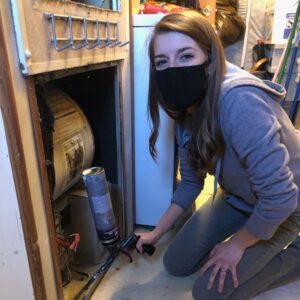In these times when everything feels expensive, we all try to find ways to save money and keep our homes comfortable.
One of the easiest ways to save money in your home is through education about how you use energy in your home and/or where it comes out. There are many things you can do to save. Here are a couple of cheap and easy tips that have proven effective in putting a couple of bucks in your pocket:
Change your bulbs to LEDs. Do you remember how your parents always told you to turn off the light when you left the room? With the new technology of LEDs, that is not such a big problem anymore. The amount of energy these bulbs use compared to their counterparts is minuscule. An LED bulb costs about $1 or $2 a year and these can last up to two decades in some cases. Although the original price of an LED may be a little higher than an incandescent bulb (the old ones) or CFLs (the spiral ones), with the annual savings, these pay for themselves in a couple of months. Change them all!
Wash with cold water. Nowadays, the detergents you buy at the store to wash your clothes are effective enough to get your pants clean. The temperature of the water does not affect how clean the clothes are. Cold water is best, not only because it will save you the expense of hot water, but it also keeps the colors on your clothes vibrant without fading.
Use the solar dryer. If possible, air dry your clothes. The sun is a free source of energy that can also dry your clothes. And when you do have to use your electric dryer, be sure to clean the lint trap after every wash and outside once a year.
Use ceiling fans. Ceiling fans are great for saving energy as they use a fraction of energy compared to air conditioning. The most important thing to remember is that fans only cool people, not rooms. If the fan is on and no one is in the room, energy is being wasted. Ceiling fans also have a function for hot and cold seasons. In the summer, the direction should be counterclockwise and vice versa in the winter.

Clean under the refrigerator. We all know that gutters need to be cleaned at least once a year, but how often should you clean under the fridge? Most new refrigerators have the condenser on the bottom. This pulls in air to make the conversion from hot to cold. By pulling the air, it also takes everything that is on the floor; dust, dog hair, etc. When the condenser is dirty, it works harder, gets hotter, and works less efficiently. That’s why it’s important to clean under the refrigerator at least 2 times a year.
Heating and AC filters. It is important that your heating and air conditioning filters are kept clean. When these are dirty, the unit has a harder time heating or cooling the air because the airflow is obstructed. This makes it consume more energy and the life of the device becomes shorter. We recommend that the filters be changed or cleaned every month or month and a half.
Phantom loads. In your home, any appliance that is plugged into an outlet is drawing electricity from you. Even when the appliance is turned off, electricity is always collected. To avoid this, we recommend unplugging the devices or connecting them to a power strip with a switch that cuts off electricity.
Change the bathroom showerhead. Have you ever run out of hot water after another family member has taken a bath? One of the ways to prevent this from happening is to change your showerhead. We recommend that shower heads be rated at no more than 1.5GPM (gallons per minute). We also recommend changing the bathroom aerators to 0.5GPM and the kitchen aerators to 1.0GPM. You can also save by lowering your water tank temperature to 120 F.
Hot water insulation. If you touch the hot and cold water pipes coming out of the tank, you will notice that they both feel hot. The reason is because the water inside these pipes is pulling the heat inside the tank out. This therefore wastes the energy that was used to heat the water inside the tank. We recommend that the first 5 feet of accessible hot and cold water piping be installed. And we also recommend insulating the tank from hot water, especially if it is located outside the conditioned space of the home.
These tips are a great way to start your journey to save on your energy bills, but you can find further info on these and much more on our website energysaversnetwork.org. And if you live in Buncombe County and income qualified, Energy Savers Network can come to your home to work at no cost. Connect with us through the website or call us at 828-585-4492 ext. 3.
Kelvin joined Green Built Alliance in the spring of 2020 as the project manager for Energy Savers Network. A native of Honduras, Kelvin brings more than a decade of experience in the building science industry to the Energy Savers Network team. In his work, Kelvin continues his passion for climate justice by working to reduce the energy consumption of homes in marginalized communities, which are often the most affected by climate change. Connect with Kelvin at Kelvin@greenbuilt.org.
You can also view this article as it was originally published in Spanish on page 44 of the 2022-23 edition of the directory.


